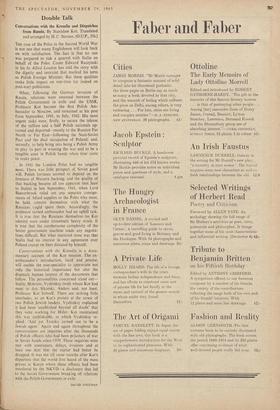Double Talk
Conversations with the Kremlin and Dispatches from Russia. By Stanislaw Kot. Translated and arranged by H. C. Stevens. (O.U.P., 35s.) THE case of the Poles in the Second World War is not one that many Englishmen will look back on with satisfaction. The fact is that no one was prepared to risk a quarrel with Stalin on behalf of the Poles. Count Edward Raczynski in his In Allied London has told the story with the dignity and restraint that marked his term as Polish Foreign Minister. But these qualities make little impact on war-time (or indeed on post-war) politicians.
When, following the German invasion of Russia, relations were resumed between the Polish Government in exile and the USSR, Professor Kot became the first Polish Am- bassador to Moscow, and remained at his post from September, 1941, to July, 1942. His most urgent tasks were, firstly, to secure the release of the million and a half Polish nationals up- rooted and deported—mostly to the Russian Far North or Far East—following the Nazi-Soviet Pact and the dual occupation of Poland; and, secondly, to help bring into being a Polish Army to play its part in winning the war and to be a tangible asset in Polish hands when time came to make peace.
In 1941 the London Poles had no tangible met. There was little prospect of Soviet good will. Polish famines seemed to depend on the firmness of Western backing; and the quality of that backing became all too apparent (not least to Stalin) in late September, 1941, when Lord Beaverbrook ruled out any separate consign- ments of Allied supplies to the Poles who must, he held, content themselves with what the Russians could spare them. Accordingly, the professor turned ambassador had an uphill task. It is true that the Russians themselves (as Kot admits) were under immensely heavy strain. It is true that the cumbersome complexity of the Soviet government machine made any negotia- tions -difficult. But what mattered most was that Stalin had no interest in any agreement over Poland except on lines dictated by himself.
Conversations with the Kremlin is a docu- mentary account of the Kot mission. The ex- ambassador's introduction, lucid and precise, will enable the non-specialist to appreciate not only the historical importance but also the dramatic human interest of the documents that follow. The personalities concerned stand out— Stalin, Molotov, Vyshinksy (with whom Kot had most to do), Sikorski, Anders and, not least, Professor Kot himself. There are striking little interludes, as on Kot's protest at the arrest of two Polish Jewish leaders. Vyshinksy explained it had been 'established beyond all doubt' that they were working for Hitler. Kot maintained this was unthinkable, to which Vyshinksy re- plied, 'And yet Trotsky turned out to be a Jewish agent.' Again and again throughout the conversations are inquiries after the thousands of Polish officers, who had been prisoners of war in Soviet hands since•l939. These inquiries were met with assurances, delays, evasions and at least one hint that the matter had better be dropped. It was riot till some months after Kot's departure that the world first heard of the mass graves at Katyn where these officers had been murdered by the NK VD—a disclosure that led to the Soviet Government breaking off relations with the Polish Government in exile.
DAVID FOOTMAN






























































 Previous page
Previous page